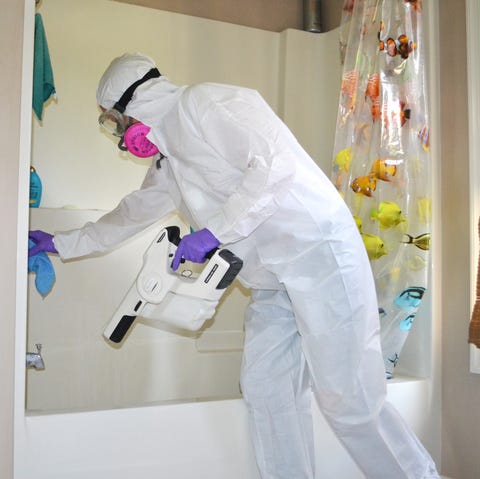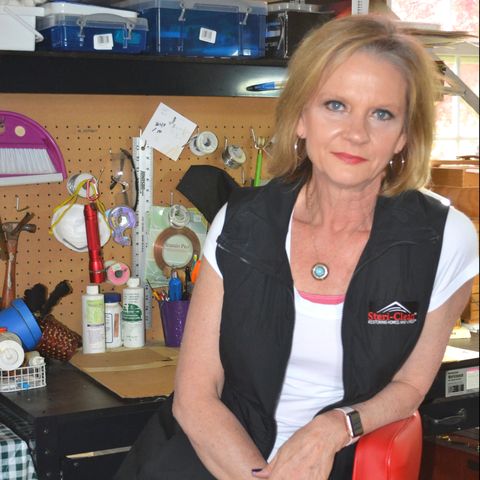One late Friday night last November, Carol Schaubhut got a call about a murder-suicide. A man had shot his wife 11 times in the shower before turning the gun on himself. It was gruesome; they needed her to come right away.
Schaubhut waited for a detective to release the scene before getting to work. She sprinkled a powerful chemical on the blood, which coagulated into a scoopable pile. Then, with an electrostatic sprayer that looked more like a Stormtrooper blaster than a cleaning tool, she disinfected the tiles and the grout. After she finished, a swab test confirmed the porcelain tub was clean enough to eat off of.
The three-hour job was one of Schubert’s last crime scenes before she pivoted to sanitizing spaces impacted by the COVID-19 pandemic. Since March, the 55-year-old franchisee of biohazard cleaning company Steri-Clean has been deep-cleaning offices, government buildings, and schools before they re-open. She uses EPA-approved solutions to kill any potential traces of the virus, which is spread through respiratory droplets produced when an infected person coughs or sneezes.
“COVID-19 cleanup is really no different than working on a crime scene,” Schaubhut tells ELLE.com. “We identify [target areas], craft a game plan, ready our equipment, and then rock and roll. We take it one step at a time. Nice and slow, to make sure we do it right.”
Schaubhut consults with clients via phone to review “touch points” before entering a potentially contagious area. What rooms has the infected person been in, what have they come in contact with, and what have they sneezed on? Then, she comes up with a “hotspot” checklist.
Areas with more objects, like desks with landlines and computers, will take longer to clean, Schaubhut says. Storage facilities and warehouses are much easier.
While the virus is easily killed on a molecular level, it’s “so contagious and can be so deadly, so quickly,” Schaubhut says. “Every possible precaution must be taken.” She requires her crew to wear full face respirators, hazmat suits with hoods, gloves, and boot coverings during all COVID-19 jobs.
Last week, Schaubhut and two of her technicians worked on the 1,500 square foot Maryland townhome of a mother who died from the virus. It was a two-story building with a fully furnished basement. Every square inch needed to be scrubbed. First, they used industrial-strength cleaner. Then, they disinfected and deodorized using the electrostatic spray gun. An ATP, or Adenosine Triphosphate, test that measures growing microorganisms confirmed the townhouse was safe to enter.
The woman’s daughter was grateful to Schaubhut. She could finally go in and collect her mother’s family photographs and treasured jewelry. “We walk into jobs with a philosophy of, ‘What if this were your mom’s house or your grandmother’s apartment?'” Schaubhut says. “We really take that to heart.”
Before the COVID-19 requests came flooding in, Schaubhut and her team worked mostly on crime scenes and hoarder homes. Their most “foul” job, as she describes it, was a 3,800 square foot rotting house in Delaware. A family of eight with 20 pets lived there, and Schaubhut estimates they hadn’t cleaned up after themselves in 10 years.
“Animal feces, urine, vomit, spilled chocolate milk that’d never been mopped up… it all piled up,” she says. “It’s incredible how bad things can get when you don’t clean.”
It took her her crew seven days to dust, disinfect and organize the chaotic property. They wore scrubs under their hazmat suits and doubled up on masks. The smell was that putrid.
“We usually go in feeling sad or bad for our clients, but as we work and see the transformation, we get excited,” Schaubhut says. “People need a safe and healthy environment to thrive and we give that to them.”
After a hard—and often smelly—day’s work in the field, Schaubhut disinfects her power tools and dumps the cleaning rags she uses into biohazard bags, which are picked up by a certified biohazard waste collection service. Then she throws her clothes in the wash and hops in the shower. She tends to her horses—there’s three on the Pennsylvania ranch where she lives with her husband—and cooks herself dinner.
Schaubhut sleeps well knowing she’s scrubbing, spraying, and scooping the world back to normal. It’s not the kind of heroic COVID-19 frontline work most people think of, but biohazard cleaners are needed now more than ever to disinfect indoor spaces.
“Everyone deserves to feel safe and comfortable,” she says. “When our clients get excited or cry or thank us, we walk away feeling really, really good.”
This content is created and maintained by a third party, and imported onto this page to help users provide their email addresses. You may be able to find more information about this and similar content at piano.io




